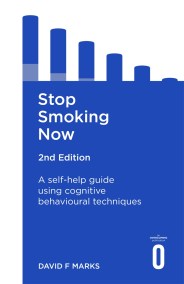How to stop smoking using CBT

The key principles of stopping smoking using Cognitive Behavioural Therapy (CBT) methods are that you live in the present and become aware of your smoking experiences. From a present-centred awareness of your smoking you can learn how to control it and eventually stop smoking. Today, we introduce a simple and easy-to-follow program that can help to reduce your cigarette consumption dramatically, often by up to fifty per cent within just twenty-four hours.
Noticing your automatic programs
Once upon a time you would never have craved a cigarette. It should not be long before you return to that state. All you need to do is to change your current programming in your brain. In effect, your mind and body will revert back to their original state before you took up smoking. All the learning that took place during your initiation to smoking – and after your habit was established – will be completely reversed. For example, once upon a time you enjoyed a meal or a drink without needing to have a smoke. Perhaps these days you always smoke after your dinner and while having a cup of tea or coffee. The signal comes – ‘dinner over, coffee made’ – and your brain automatically responds by playing the ‘I want a cigarette now’ program. You respond automatically and, if possible, light up. If you need to go outside to do so, you excuse yourself and leave.
Here is an example of the kind of program that automatically begins to run through your mind when you light a cigarette:
Ah . . . that feels better. I really needed this cigarette. I’m enjoying this cigarette. It satisfies me. It relaxes me. I feel more alive, more stimulated. I am enjoying myself. That’s better. I feel good.
The aim of using CBT is to completely remove this deluding programming so that, when you inhale the poisonous fumes of a cigarette, your mind does not play you this misleading message. When you draw cigarette smoke into your lungs, you need to be told what is really happening to your body. This can be achieved by deliberately and consciously repeating a more accurate program in your mind during the process of smoking.
Deprogramming your mind
A highly effective substitute program is given below. Let’s call it ‘NURD’, because of the four key letters involved. Learn it and repeat it to yourself every time you smoke a cigarette from now on. When you do so regularly, you will quickly discover that your cigarette consumption is dropping rather dramatically. Within twenty-four hours your consumption should be reduced by 25 to 50 per cent. It is necessary to learn it by heart and use it every time you have a cigarette from now on.
‘NURD’ operates at the thinking, feeling and behavioural levels of your mind at the same time. Each part of your mind is receiving the same message. The feeling and behavioural parts of your mind don’t understand words as such; they only understand the tone and tenor of the communication. The ‘ambience’ and timing, if you like. Saying and thinking ‘NURD’ allows all three areas to realise that you are not enjoying smoking anymore and that it is giving you no satisfaction – and this is done while you are in the act of smoking.
Using ‘NURD’
From now on, you should smoke every cigarette deliberately and with concentration. If you are able to, stop whatever you are doing for a few minutes and really concentrate on your smoking. Repeat the program to yourself. When you say to yourself, ‘This is an unpleasant experience,’ think about the parts of our body which are directly affected by this unpleasant experience – your tongue, mouth, throat and lungs and feel especially the extra strain being placed upon your heart. At first you may not actually experience anything as being very unpleasant. However, keep repeating the program every time you smoke. Within a day, you will notice that this has dramatically affected the way you experience cigarette smoking. It is important that you use Program 1 every time you have a cigarette. Recite it automatically.
It is entirely up to you how thoroughly you are prepared to work at deprogramming your desire to smoke and thus not have to cope with that awful craving feeling. Some people completely deprogram themselves in a matter of days and their desire to smoke is reduced to zero. Others deprogram themselves sufficiently well to make the fight against their smoking desire an easier one to handle.
David F Marks is the author of Stop Smoking Now, and has been involved in studying the effectiveness of cognitive behavioural therapy for quitting smoking for 40 years. For more support in giving up smoking, you can also visit the NHS Stop Smoking website.
Have you ever tried to give up smoking?
Most smokers have. It is even more difficult to avoid relapse - after days, weeks or even years - and the long-term results of many stop smoking programmes are disappointing. But this week-long programme can help you stop smoking for good.
Professor David F Marks uses techniques from cognitive behavioural therapy (CBT), which has been proven to be effective by teaching you how to 're-program' your mind to not want to smoke. You will no longer have to rely on willpower alone to give up smoking. By becoming aware of your smoking triggers and dealing with the thoughts and behaviours that lead you to smoke automatically, over the course of a week you will gradually find your cravings disappear altogether.
You will learn:
· Exercises and strategies to help you regain control from your smoking automatic pilot
· Advice on relaxation and stress reduction
· How to avoid future relapses
· Why alternative approaches such nicotine replacement therapy or e-cigarettes are less effective
· Tips on healthy eating and exercise to manage weight
Stop Smoking Now will help you not only give up your habit, but help you to remain a non-smoker for life.
Overcoming self-help guides use clinically proven techniques to treat long-standing and disabling conditions, both psychological and physical. Many guides in the Overcoming series are recommended under the Reading Well Books on Prescription scheme.
Series Editor: Professor Peter Cooper




